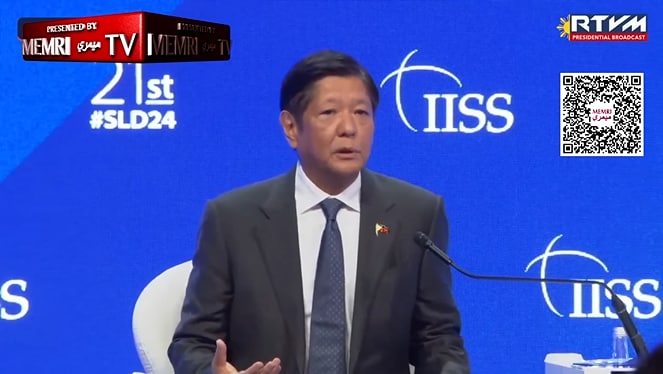
After delivering the keynote address at the International Institute for Strategic Studies (IISS)’s Shangri-la Dialogue in Singapore on May 31, 2024, Philippine President Ferdinand Marcos Jr. was asked a question by Chinese Major General Xu Hu, the Commandant of the PLA's International College of Defense Studies. General Xu asked about the Philippines' "behavior" in the South China Sea, and President Marcos said: "There is no such thing as a regional issue any longer. We have all experienced the unexpected effects of the war in Ukraine, and of the conflict in the Middle East. When we talk about the South China Sea, we have to also remember that the South China Sea is the passageway for half of the world trade and therefore the peace and stability of the South China Sea and the freedom of navigation of South China Sea is a world issue."
Xu Hu: "Mr. President, I know that it is in your speech... you mentioned many times about Asian centrality. You have reviewed the TAC, which your father signed, that showed the bond of Asians. I think the Asian centrality is very important, but let's not take it for granted. It comes from the Asian way. Three principles: First, mutual respect. Second, consensus building. Third, consider other parties on the first level. In my words, to put it simply, we can summarize it as three "no's". No intervention. No use of force. No hyping up hot spots.

"It is only because of these principles [being] strictly followed by Asian members and other stakeholders that we have ensured our sea and East Asia at large, for a long-lasting peace, sees the end of the colonial rule in history. So, we cherish that and fully agree with you. I support the centrality and even some professors like, Xiao Ma. He suggests that Asians deserves an award of peace, Nobel Peace Prize. I agree with him."
Moderator: "Thank you very much. I think your question is: 'Do you agree with me?' So, President Marcos, please... Thank you very much."
Xu Hu: "In the eyes of the international community, some of your Philippines' behavior in recent times has not sounded like you really considered other parties' comfort level. And there is a risk of ruining the regional long-earned, long-lasting peace since the end of the colonial history. What's your comment on that?"
Ferdinand Marcos Jr.: "Well, I cannot imagine what you must be referring to. If the reference, or the allusion, is that the Philippines is somehow tearing apart what we have agreed on in terms of Asian centrality.
"Quite the contrary, I think if you examine, more closely, the remarks I just made, I precisely focus on Asian centrality. And that, the principles that are laid down, that are involved in the concept of Asian centrality, are some things that we must use to guide us. And if we have been distracted in the past years or so, then it's time for us to return and remember once again, what Asian centrality was created for, and that is to create and connection of nations that have very many common interests. And partnerships within that multilateral organization can help each other and help the region. And so, the Philippines still remains true to the principles that were established. And upon which Asian centrality was born.
"And I think, as I said, that many of these things, we no longer speak of today, but we must because they are as relevant today as they ever were. Perhaps, even more so. Because the global situation is a great deal more complicated than it used to be before. I would even go so far as to say, there is no such thing as a region issue any longer. We have all experienced the unexpected effects of the war in Ukraine, of the conflict in the Middle East.
"And when we talk about the South China Sea, we have to also remember that the South China Sea is the passageway half of the world trade. And therefore, the peace and stability of the South China Sea and the freedom of Navigation in the South China Sea is a world issue. And that is what I am proposing. I am saying that yes, this is a regional issue, but we must examine and be part of the discussion. We must include all parties in the discussion because now, it is not just members of states who are stakeholders. And it is quite easy to see, it is in fact the entire world that have become stakeholders in the peace and stability of our region."













